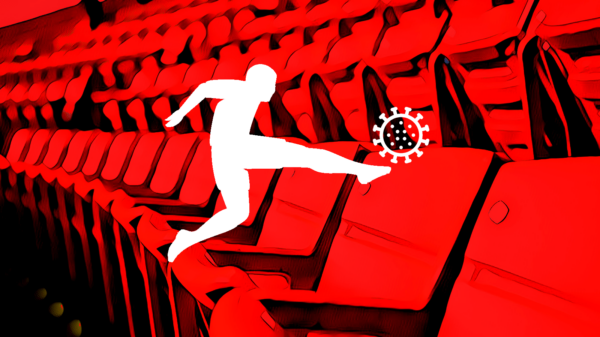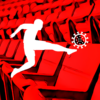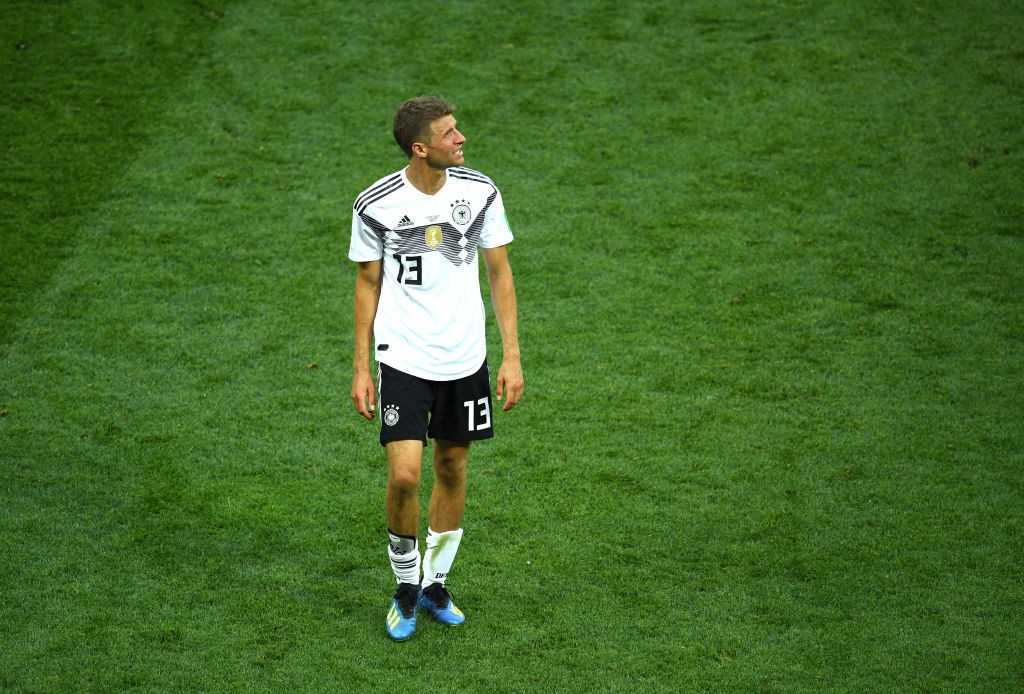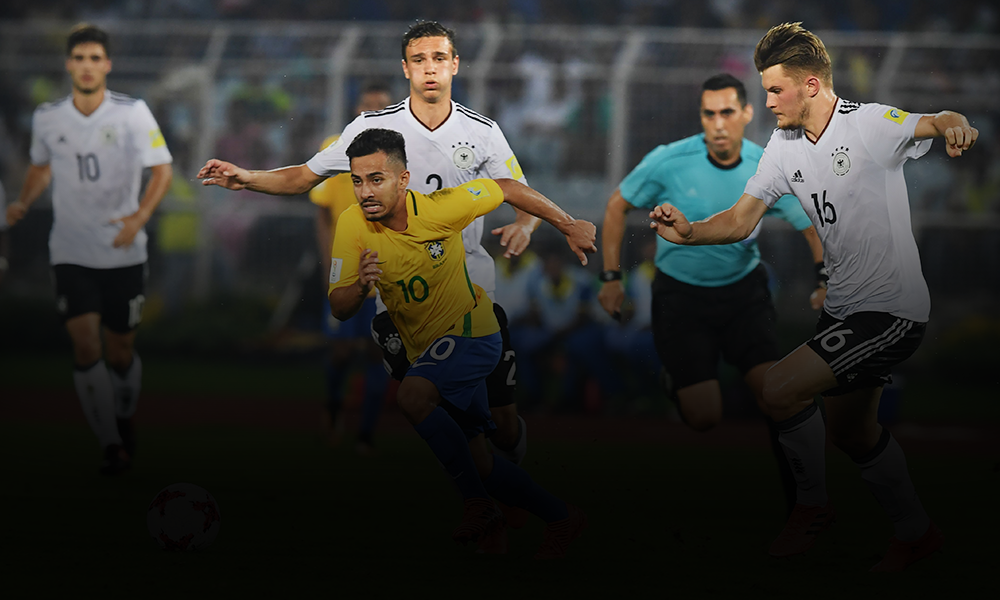Rishad Bharucha tactically analyses Germany’s 1-0 victory over Northern Ireland at Euro 2016; a result that ultimately saw both teams qualify for the knock-out stages.

Northern Ireland (4-5-1): 1. McGovern; 5. J. Evans, 20. Cathcart, 4. McAuley, 18. Hughes; 14. Dallas, 16. Norwood, 8. S. Davis, 13. C. Evans, 19. Ward; 11. Washington.
Germany (4-2-3-1): 1. Neuer; 3. Hector, 5. Hummels, 17. Boateng, 21. Kimmich; 18. Kroos, 6. Khedira; 19. Götze, 13. Müller, 8. Özil; 23. Gomez.
The Ireland national rugby union team may unite the fortunes of the Republic of Ireland and Northern Ireland at the Six Nations, but at the footballing European Championship, each of the two nations is subject to contrasting expectations. While the Republic of Ireland have often left tournaments with a sense of underachievement, the same cannot be said of Northern Ireland at this summer’s Euros. The Green and White army cannot be faulted for their solid resolve to push through the group stages. Following a a 1-0 defeat to the Poles and a 2-0 win against Ukraine, they looked like they would land a surprise spot in the last 16 by being one of the top third-placed teams. A defeat with a four goal or greater deficit, however, would put an end to their fairytale.
Meanwhile, world champions Germany proved to be efficient as ever, doing just enough to get through the group stages beating Ukraine 2-0 and drawing a blank against the Poles. There is little to suggest that the Germans are struggling tactically, but there is a case for those who believe that some of their individuals aren’t firing on all cylinders. On paper, it might seem that a German attack not too dissimilar to the one which annihilated Brazil in the 2014 World Cup semi final, could repeat the same feat on a less prolific attacking team. Die Mannschaft managed to get a solitary goal after a series of one touch combinations in and around the box, but faced a solid Northern Ireland defense for most of the game.
Northern Ireland – Defensive Organization
Northern Ireland were content to let Germany keep possession and defend deep inside their own half for the majority of the game. One might be tempted to borrow an expression from their footballing neighbours and suggest that they decided to “park the bus”, but that would be a little harsh on the Northern Ireland team. There was little to no closing down in the opposition half, which allowed Manuel Neuer to play long to the wings or short passes to Hummels and Boateng as he pleased. There was even enough space for Sami Khedira to drop back a little to receive the ball and then go forward with little pressure before supplying the more offensive midfielders.

The German defense is allowed to build from the back
Fans of more attacking football would probably be bored and even frustrated by such defending, but it takes a great deal of discipline to stick to a plan and execute it for 90 minutes. There weren’t a lot of occasions where the Northern Ireland players made attempts to press and win the ball in midfield. When they did press a few times, they were sensible and managed to possess the ball for a short period of time. They did however, close down space in and around the box effectively, even if it sometimes required a last ditch but crucial effort.
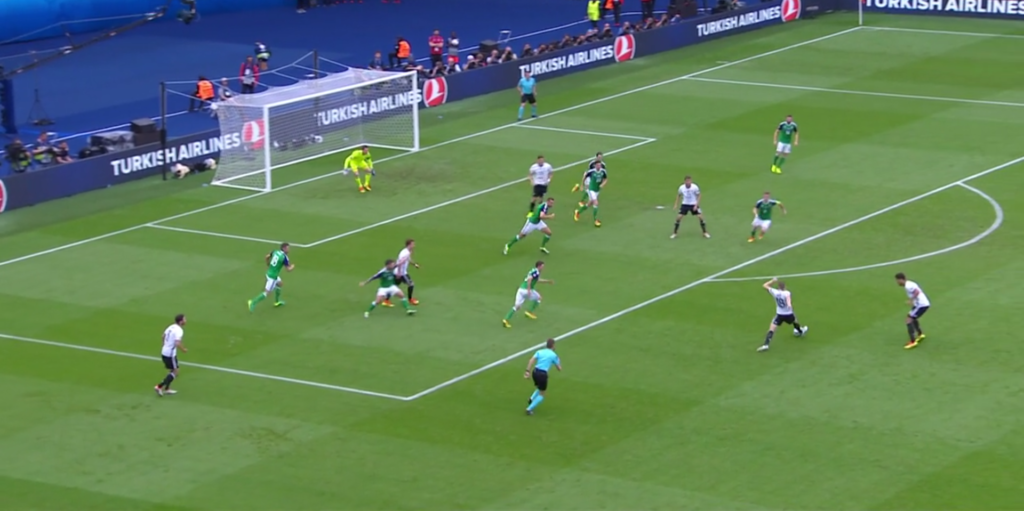
The Northern Ireland defense rush to close the space in and around the box
There was little to no pressure on Germany’s wide players in the final third, which allowed Germany plenty of time and space to get crosses into the box for Mario Gomez to latch on to. However, as is the case against a team that is defending deep, unless you move the ball quickly from one part of the field to another, the play slows down a little and even the opportunity to get the ball to a wide player can sometimes go begging.

The German wide players are under no pressure
Germany – Offensive Organization
It’s often a sign of domination when a team’s fullbacks, Kimmich and Hector in this case for the Germans, push high up and spend more time in possession in their attacking half than tracking back to defend. They were both effective with their crosses and cut backs to the midfield. While there wasn’t an overall reliance on switching the point of attack after generating an overload on one flank, they were direct and willing to take on their opposition.

A passing option without pressure on the German flanks
For the technical quality that the Germans possess, they were certainly sound in possession, but found it difficult to create spaces behind opposition defense when the play slowed down. In the first half, the Germans did well to move the ball quickly after building from the back and looked to play the final ball as early as possible. This resulted in some short, back and forth transitions which were the moments when Germany managed to get the wide players behind the back four for a cut back or a cross. A couple of chances fell to Thomas Müller from these positions, but they either hit the bar or were marginally off target.

The Germans build from the back with little to no pressure
From some of the more end-to-end transitions, the Germans managed to get enough runners in the right spaces to fashion some one touch combinations on the edge of the box, only for the heroics of Michael McGovern to deny them a higher scoreline. The transitions waned in the second half, with Germany more content to keep the ball and their scoreline, and invite Northern Ireland on to the front foot.

Quick transitional play from the Germans
Northern Ireland – Offensive Organization
A lack of inexperience in Europe’s top league’s showed in the decision making behind some of the Northern Ireland attacks. While a couple of well-timed presses led to transitions where the point of attack was often switched to the left, one of Dallas and Norwood would trade passes, while the other would look to cut inside and shoot early, when a momentary delay to bring a third attacker in to the play to overload the defense was another option they could have explored.

A Northern Ireland counter attack ends at the feet of Hummels
Most crosses were also blocked easily by the German full backs on both flanks. It also was not an uncommon sight to see Hummels head the ball from McGovern’s goal kicks away from the lone striker, Washington. There weren’t many set piece opportunities for them to exploit either, which meant their attacking avenues were limited overall.
Germany – Defensive Organization
The German defense were not extensively tested in this game. Off the ball in midfield, they occupied the right spaces, which enabled them to close down the opposition without running out of breath and applying too much pressure. With their dominance in possession in Northern Ireland’s half, there wasn’t much for Neuer to sweep up either.

The Germans have the important spaces covered
Overall, this was a game in which the Germans dominated the possession but did just enough in the final third to win the game. Northern Ireland can be proud of their effort against the world champions and take plenty of positives with them into the last 16.
Written by Rishad Bharucha
- Tactical Analysis: Schalke 0-1 Leverkusen | Sending off ruins Schalke plans - December 19, 2016
- Tactical Analysis: Dortmund 4-1 Mönchengladbach |Dortmund’s patience and clinical finishing - December 8, 2016
- Tactical Analysis: Wolfsburg 1-5 Borussia Dortmund | Tuchel’s men win emphatically - September 24, 2016




















































